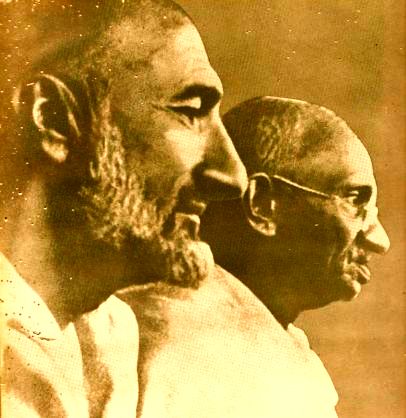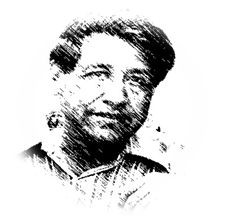
|
||||||||||||||||
Click image for bio
 (from Wikipedia)
Khan Abdul Ghaffar Khan (1890 - 20 January 1988) was a Pashtun political and spiritual leader known for his non-violent opposition to British Rule in India. A lifelong pacifist, a devout Muslim, and a close friend of Mahatma Gandhi, he was also known as Badshah Khan (also Bacha Khan, Pashto: lit., "King Khan"), Fakhr-e-Afghan (pride of Afghans) and Sarhaddi Gandhi (Urdu, Hindi lit., "Frontier Gandhi").
(from Wikipedia)
Khan Abdul Ghaffar Khan (1890 - 20 January 1988) was a Pashtun political and spiritual leader known for his non-violent opposition to British Rule in India. A lifelong pacifist, a devout Muslim, and a close friend of Mahatma Gandhi, he was also known as Badshah Khan (also Bacha Khan, Pashto: lit., "King Khan"), Fakhr-e-Afghan (pride of Afghans) and Sarhaddi Gandhi (Urdu, Hindi lit., "Frontier Gandhi").
He was initially encouraged by his family to join the British Indian Army; however the treatment of a British Raj officer towards a native offended him, and a family decision for him to study in England was put off after his mother's intervention.
Having witnessed the repeated failure of revolts against the British Raj, he decided social activism and reform would be more beneficial for Pashtuns. This ultimately led to the formation of the Khudai Khidmatgar movement (Servants of God). The movement's success triggered a harsh crackdown against him and his supporters and he was sent into exile. It was at this stage in the late 1920s that he formed an alliance with Gandhi and the Indian National Congress. This alliance was to last till the 1947 partition of India.
Ghaffar Khan strongly opposed the Muslim League's demand for the partition of India.[2][3] When the Congress party accepted the partition plan, he told them "You have thrown us to the wolves."[4]
After partition, Ghaffar Khan was frequently arrested by the Pakistani government in part because of his association with India and his opposition to authoritarian moves by the government. He spent much of the 1960s and 1970s either in jail or in exile.
In 1985 he was nominated for the Nobel peace prize. In 1987 he became the first person not holding the citizenship of India to be awarded the Bharat Ratna, India's highest civilian award. Upon his death in 1988, he was buried in Jalalabad, despite the heavy fighting at the time, both sides in the Afghan war declared a ceasefire to allow his burial.
In time, Ghaffar Khan's goal came to be the formulation of a united, independent, secular India. To achieve this end, he founded the Khudai Khidmatgar ("Servants of God"), commonly known as the "Red Shirts" (Surkh Posh), during the 1920s.
The Khudai Khidmatgar was founded on a belief in the power of Gandhi's notion of Satyagraha, a form of active non-violence as captured in an oath. He told its members:
"I am going to give you such a weapon that the police and the army will not be able to stand against it. It is the weapon of the Prophet, but you are not aware of it. That weapon is patience and righteousness. No power on earth can stand against it."
The organization recruited over 100,000 members and became legendary in opposing (and dying at the hands of) the British-controlled police and army. Through strikes, political organisation and non-violent opposition, the Khudai Khidmatgar were able to achieve some success and came to dominate the politics of Khyber-Pakhtunkhwa. His brother, Dr. Khan Abdul Jabbar Khan (known as Dr. Khan Sahib), led the political wing of the movement, and was the Chief Minister of the province (from the late 1920s until 1947 when his government was dismissed by Mohammad Ali Jinnah of the Muslim League).
Links:
- Scholarly biographyof Abdul Ghaffar Khan by Dr. Sayed Wiqar Ali Shah
- Baacha Khan Trust
